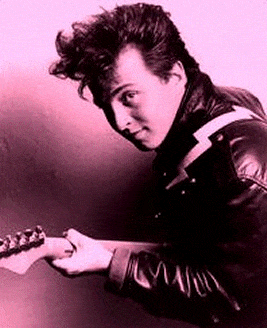 He formed his first band The Hoodoo Men and their first live show was a Winnipeg coffeehouse while still only 16. After making Vancouver his new home, some steady gigs in smaller venues with his new band Night Shades eventually built his live reputation enough that he was opening for George Thorogood & The Destroyers and John Lee Hooker later that year, then Stevie Ray Vaughn & Double Trouble. In ’86 he hooked up with manager Larry Wanagas, who was handling KD Lang at the time. He released a 12″ single on Bumstead Records which featured the original “Five Long Years”, backed by a cover of Morgan Davis’ blues number “Why’d You Lie?”. The record quickly caught on with college radio, and James knew he’d have to tour incessently to develop a following. He put together a band and toured Canada and made frequent stops in the US for the next year. He caught the attention of execs at Virgin Records and was signed to a deal in 1987. He released his self-titled debut with Tom Dowd, Danny Kortchmar and Bob Rock (Payola$, Metallica) producing the next year. A blues-rock fusion, the album quickly shot up the charts and the first single “Voodoo Thing” instantly announced that he was going to be a force to be reckoned with. In what would turn out to be Canada’s fastest-selling album of all-time to that point, other singles would follow. “Dream Of Satin”, “Chicks and Cars and The Third World War” plus redone versions of “Five Long Years” and “Why’d You Lie” all helped push the album gold. The videos for “Voodoo Thing” and “Five Long Years” also helped make Colin James a staple on the video networks. More constant touring ensued, backing the likes of Steve Winwood, Keith Richards, Little Feat and Fabulous Thunderbirds. He also walked out of that year’s Juno Awards as most promising new artist. His follow-up was 1990’s SUDDEN STOP. With the base tracks recorded in Vancouver, he took the tapes to Memphis to work with ZZ Top & Steve Earle producer Joe Hardy (no relation to Frank). The album featured bg vocals by Bonnie Raitt as well as The Memphis Horns rounding out the sound. The first single was the lead-off “Just Came Back”, which scored him a #1 in Canada and placed in the top 10 in the US. Three other singles were released, and “Keep On Loving Me Baby”, “If You Lean On Me” and “T Stands For Trouble” all helped gain platinum status and made the album #2 on the US charts. More non-stop touring was in the works, doing dates in The natural evolution in his music continued 3 years later with the release of ’93’s COLIN JAMES & THE LITTLE BIG BAND. Never one to be ‘labelled’ or ‘tagged’, it was definitely astray from what was the ‘norm’ on radio at the time – a departure from his pop-blues image he’d mastered after only two records. Recorded with Rhode Island’s legendary Roomful Of Blues horns section and produced by Chris Kimsey, it featured 40’s & 50’s jump-jive tunes and reworkings of Rosco Gordon, Roy Brown & Ike Turner songs. Tho it took awhile for the public’s bewilderment to subside, it eventually sold 200,000 copies in Canada alone and certified double platinum, leading to tours across North America. Backed by the success of the singles “Cadillac Baby”, as well as “Breakin’ Up The House” (later recorded by ex-Stones bassist Bill Wyman) and “Surely I Love You”, a European leg of the tour opening up for The Rolling Stones soon followed. A departure from Virgin saw the label release a greatest hits package called THEN AGAIN in ’95. which featured 3 new tracks, “Stay,” “I Hope You’re Happy,” and a cover of Robert Johnson’s “Milk Cow Blues,” all recorded in the Bahamas. James resurfaced on Warner Brothers the same year with BAD HABITS. Back to his blues roots, the album took on a heavier, more direct approach under the return of Chris Kimsey as producer. A gentle mix of original material and the blues roots that made up the foundation of his sound, the album also featuring The Roomful Of Blues again. The first single was “Freedom”, followed by “Saviour” – one of his most powerful videos to date. Other noteable cuts included the remake of Howlin’ Wolf’s “Forty Four”, Robert Johnson’s “Walking Blues” and the original “I Can’t Hold Out”. His second Juno for best male vocalist came the next year. For his next project James teamed up with long-time friend Colin Linden for ’97’s NATIONAL STEEL. A stripped-down return to the Delta blues influences which were his main influence. Critical acclaim came calling for covers like Yank Rachell’s mandolin-dominant “Shout Baby Shout”, Muddy Waters’ “Rollin’ Stone”, Otis Redding’s “These Arms Of Mine”, Albert Johnson’s “Kind Hearted Woman” and Mahal’s “Goin’ Up To The Country”. A series of select dates across the continent helped the album become one of his most critically successful and earned the pair a Juno for best blues recording. He returned to the swing-sound he’d helped the industry rediscover a few years earlier for 1998’s LITTLE BIG BAND II. Following the formulahe’d laid out in ’93, it featured FUSE was next. Released in 2000, it featured James returning to his blues roots again and highlighted some of his most critically-acclaimed guitar work to date. Showcasing some new original material as well as impeccable renditions of the classics, tracks like the lead single “Hide”, “Stop Bringing It Down On A Perect Day” and “Get Carried Away” rekindled the blues fire that’s kept Colin James at the top of the blues-rock genre. 2003 saw the release of TRAVELER. Mostly original recordings written by Jeff Trott and Craig Northey, the singles “I’m Losing You” (originally done by John Lennon) and “Make A Mistake” were a good indication of the stripped-down ‘earthier’ sound brought to the table by new producer Mark Howard, whose most noteable work to that point was with Lucinda Williams. Other tracks included Nick Drake’s “Black Eyed Dog” and Jimi Hendrix’s “Rainy Day Dream Away”. A cross-country tour with Bryan Adams ensued, including a series of 4 sold-out shows in BC in aid of the fire-relief effort – raising a quarter of a million dollars in the process. Colin James revolutioned the blues-rock movement and spear-headed the revival of swing music in pop in the 90’s. He’s toured with anyone you associate with ‘blues classics’ and has worked with such artists as Long John Baldry, The Chieftans, Wide Mouth Mason, Big Dave McLean & Johnny Halliday, as well as serving as engineer for remasterings of vintage Yes & T.Rex projects and served as producer/host for the CBC series ‘The Blues Masters’ in 2001. In 2003 he was hired by TSN to do a hockey song-promo for them – in retaliation to Bryan Adams doing one for CBC. The third installment of the Little Big Band series was released in 2006. “The Little Big Band, what it is for me is a way for me to put out lots of music, without necessarily having to sit and slave over the writing for two years,” James joked. “I pick a Jackie Wilson or a Ray Charles, I pick the best music I can find … I’m really, really happy. Again, I got to pick from the same well of players. It’s actually in a lot of ways a lot like the first one I did in ’93,” he added. Trimmed down from 32 recorded tracks, as usual, James delivered with blues and jazz standards done up in a slick, modern package, including “I’m Shakin’,” “Where Y’At,” “Lonely Avenue” and “I Want You To Be My Baby.”
|

 North America for nearly a full year before embarking on a series of shows in Germany, France & Sweden with ZZ Top. More accolades at that year’s Junos would follow, walking home with best single for “Just Came Back” and male vocalist of the year.
North America for nearly a full year before embarking on a series of shows in Germany, France & Sweden with ZZ Top. More accolades at that year’s Junos would follow, walking home with best single for “Just Came Back” and male vocalist of the year. covers of traditional swing classics of the 40’s such as the lead-off “Jumpin From 6 To 6”, “Tin Pan Alley” and “Safronia”, as well as Cab Calloway’s “C’mon With the C’mon”, Ray Charles’ “Mary Ann”, and Willie Dixon’s You Know My Love”. The record also included more of a blues-influence than LITTLE BIG BAND 1 and helped push the album gold and reaching #14 on the charts.
covers of traditional swing classics of the 40’s such as the lead-off “Jumpin From 6 To 6”, “Tin Pan Alley” and “Safronia”, as well as Cab Calloway’s “C’mon With the C’mon”, Ray Charles’ “Mary Ann”, and Willie Dixon’s You Know My Love”. The record also included more of a blues-influence than LITTLE BIG BAND 1 and helped push the album gold and reaching #14 on the charts.